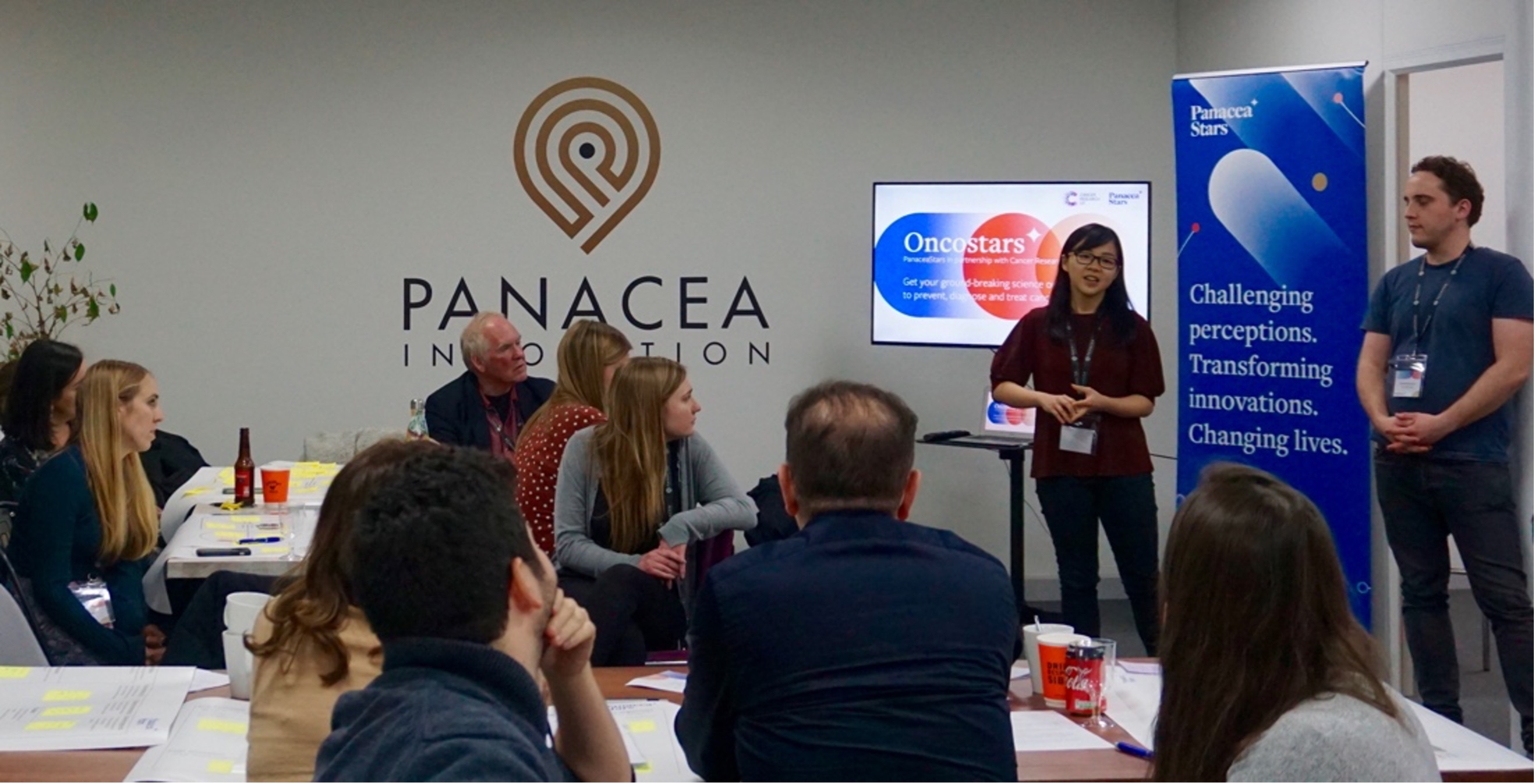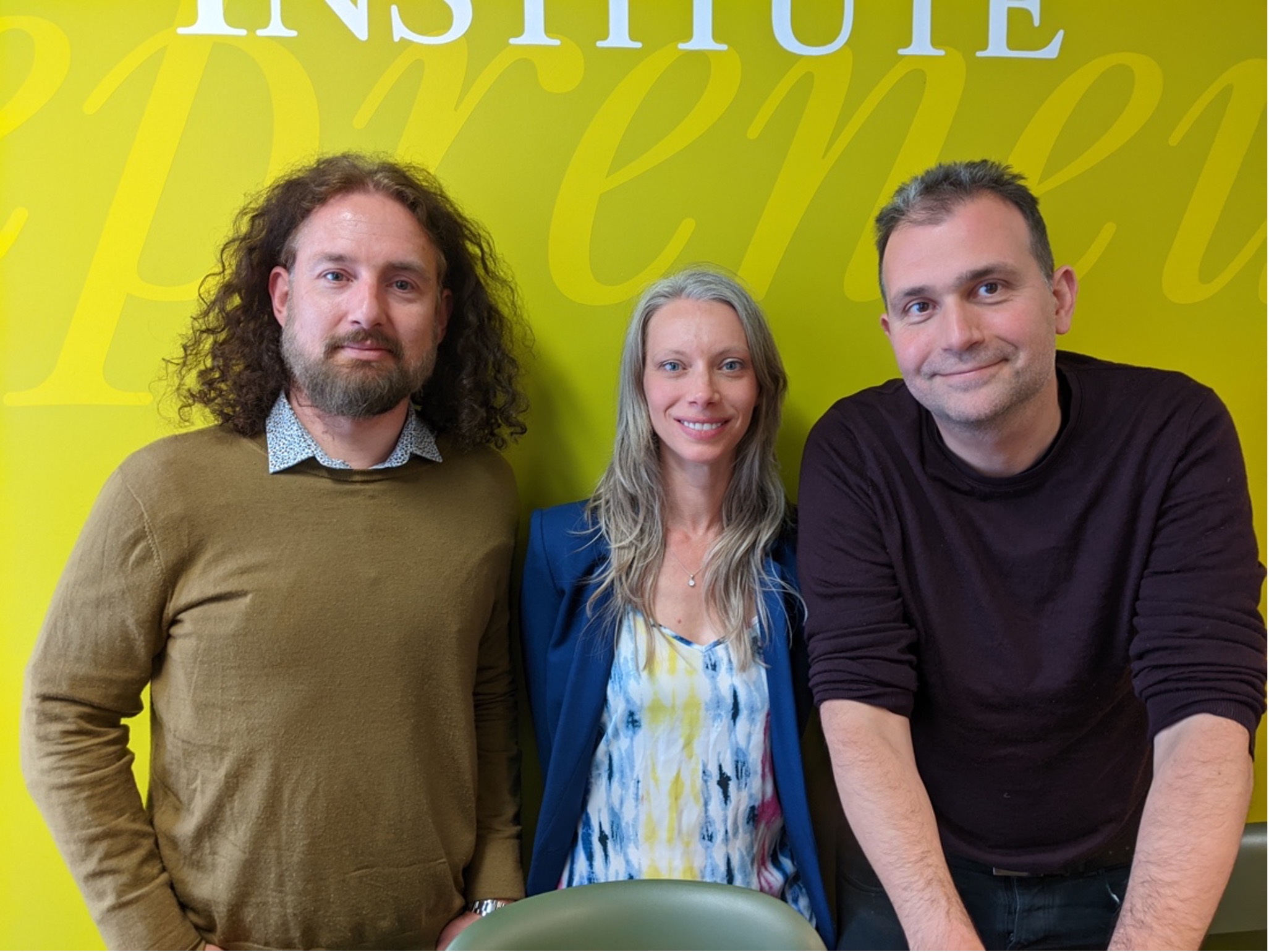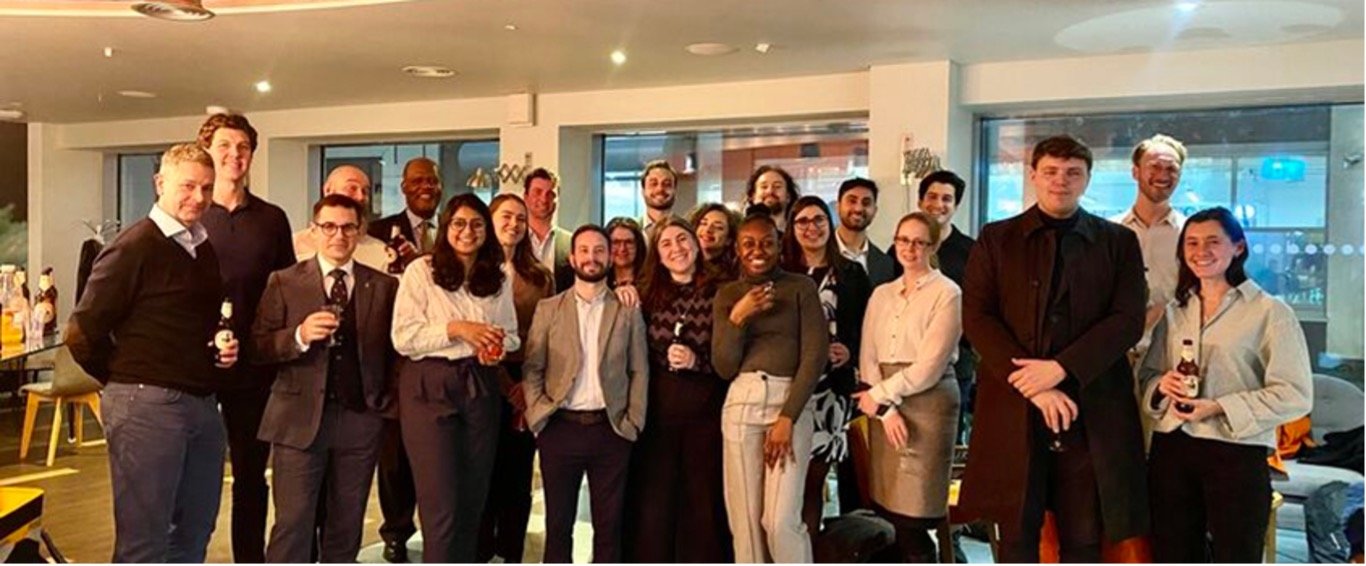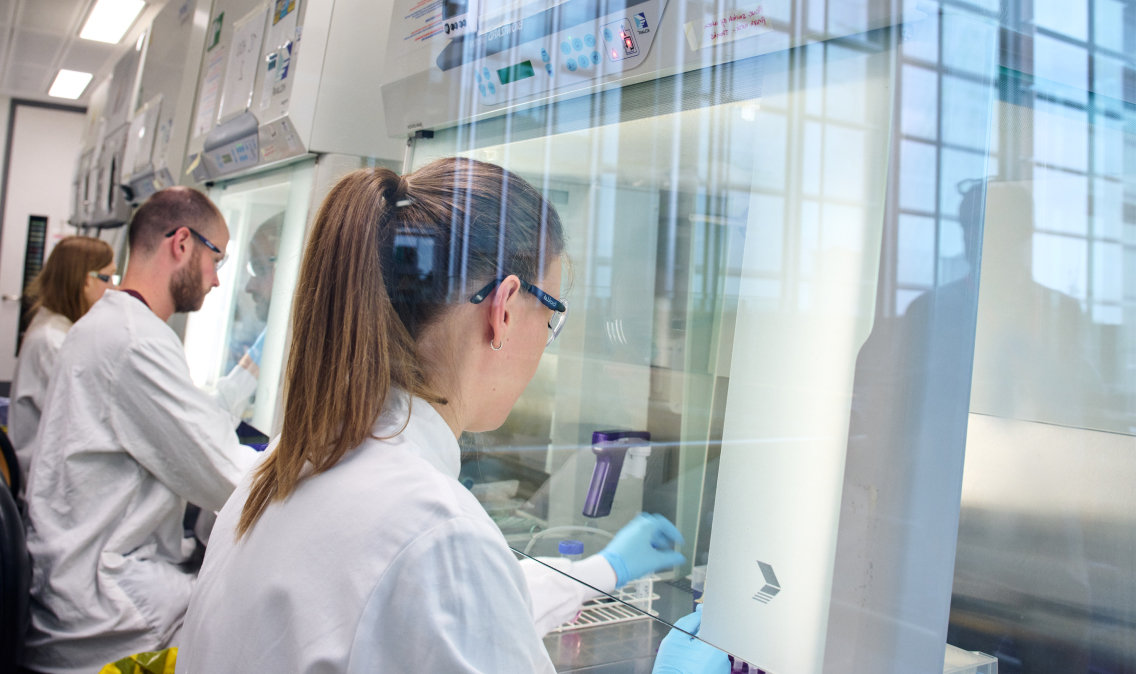Cultivating translational discoveries
Cancer Research Horizons cultivates translational discoveries and business concepts in three ways: meeting with researchers, offering grants, and giving awards designed to catalyse innovative research and highlight entrepreneurial achievements.
Continue

Search & Evaluation
Over the past year, we’ve continued to provide a transparent and customer-centric service to our researchers. Our Search & Evaluation team has resumed in-person interactions and worked hard to support researchers in their translational endeavours.
We have had a very positive year and continue to see an increase in invention disclosures compared to the previous year.
We met with hundreds of principal investigators, both virtually and in person, in places where researchers shared their discoveries and discussed how to translate them into patient benefit.
In 2022/23, the average time from disclosure to formal decision was 60 days; 92% of disclosures received a decision within our committed timeframe of three calendar months (up from 86% in the previous year).
In total, we engaged more than 470 principal investigators, established 118 invention disclosures and filed 45 patents.
12 projects granted translational funding support
In 2022/23, we granted Translational Funding Awards to 12 projects across 11 institutions, ranging from in-vivo proof-of-concept studies to key reagent or product generation. These awards support our researchers to move their ideas towards patient benefit.
“This funding provided us with critical resources to translate our preliminary findings on cytokine modifications to preclinical models in the hope of designing more efficacious therapies for haematological malignancies.”
Ian Hitchcock, University of York
Petra Hamerlik
University of Manchester
Spotlight on tear biomarker profiling for early detection of brain cancer
Non-specific early symptoms of brain tumours can contribute to diagnostic delays and possible disease progression. General practitioners (GPs) seeing patients with non-specific symptoms should be able to identify patients who warrant further investigation without an increase in unnecessary brain imaging, which may expose incidental abnormalities. Consequently, there is a high unmet need for an affordable and accessible screening/triage tool in primary care. The University of Manchester’s Professor Petra Hamerlik has a tool that aims to meet that need.
“This award will enable us to commence a multi-centre UK study that intends to validate the use of tear fluid as a proximal liquid biopsy for early detection of brain cancer.”
Tear samples are increasingly being used for the diagnosis of various ocular surface disease states such as diabetic retinopathy, allergy and dry eye. Unlike the collection of blood or cerebrospinal fluid, tear collection is non-invasive. Despite its proximity, it hasn’t been explored for brain cancer diagnosis. Hamerlik’s pilot study interrogated the utility of tear-bound proteome to differentiate brain cancer patients from healthy volunteers. Her team developed a tear-protein-based classifier that can differentiate brain cancer patients from healthy volunteers with ~99% accuracy. Currently, they are initiating a multi-centre study in the UK to validate their preliminary findings and explore the utility of this tool for non-invasive monitoring responses to therapy and onset of recurrence.
Spotlight on
Tears and biomarker profiling for early detection of brain cancer
Prof. Petra Hamerlik
University of Manchester
Dr Qiang Wang
University of Edinburgh
Spotlight on early detection of lung cancer
Lung cancer is the leading cause of cancer death worldwide. Most lung cancer patients are diagnosed at a late stage, leading to poor survival rates; approximately 13% of patients survive five years. Early detection, and fast and reliable characterisation of lung cancer will enable the treatment of more patients and potentially improve their chances of survival.
Currently, there is no routine screening for lung cancer. Chest X-rays do not provide a definitive diagnosis because the images do not distinctly distinguish cancer and other conditions. To address this unmet need, Dr Qiang Wang from the University of Edinburgh is working to improve diagnosis by characterising lung cancer, applying artificial intelligence to ensure the disease is recognisable during an endoscopic procedure.
“We secured additional funding from Cancer Research Horizons,” said Dr Qiang. “Their support was invaluable for enabling the efficient use of valuable patient samples and expanding the capabilities of our technology. It is reassuring to know that Cancer Research Horizons will keep supporting us in developing our technology.”
To improve lung cancer diagnosis, the team captures images of lung tissue using a special microscopy technique. They then process these microscopy images using artificial intelligence to diagnose lung cancer and characterise its subtypes.
Dr Qiang Wang started this promising research with support from Cancer Research UK’s Early Detection and Diagnosis Primer Award.
Roland Arnold
Birmingham University
Spotlight on the Bladder Cancer Prognosis Programme
Bladder cancer is the 10th most common cancer worldwide, with over 500,000 new cases of bladder cancer diagnosed each year. Even with effective surgery, chemotherapy and radiation, advanced bladder cancers are difficult to treat.
At Birmingham University, Professor Richard Bryan, Dr Benjamin Tura and Dr Roland Arnold are developing a searchable and user-friendly ‘data warehouse’ by optimising the linkage of existing and future Bladder Cancer Prognosis Programme (BCPP) clinical and laboratory-based (omics and digital pathology) datasets.
BCPP is a complex and comprehensive compilation of datasets derived from analysing bladder cancer samples collected over a 10-year span. The compilation follows programme grant funding by Cancer Research UK for compiling genomic, transcriptomic and proteomic data sets. The BCPP biospecimen collection is linked to long-term clinical outcomes and existing genomic, transcriptomic and proteomic datasets, and represents one of the most significant bladder cancer research resources in the world for both academia and industry.
“We’re very grateful for the exceptional help we’ve received from Cancer Research Horizons.”
With support from Cancer Research Horizons, the BCPP were given one of the first Winton CRUK Data Innovation Awards for the creation of a searchable and user-friendly BCPP data warehouse, allowing more streamlined commercial exploitation of the datasets. “We’re very grateful for the exceptional help we’ve received from Cancer Research Horizons,” said Dr Roland Arnold. “They introduced the BCPP team to the opportunity of the Winton CRUK Data Innovation Award and were very supportive throughout the application process. The Data and AI team have been instrumental in our company interactions. The award will allow us to make our data available in a structured way, to make it AI-ready and hence will multiply the value of our data for research and patient benefit.”
Since its start in October 2022, the award has proven to be extremely beneficial to the research team, and the BCPP database has already resulted in enquiries from both academic and company partners.
Winton CRUK Data Innovation Awards
The Winton CRUK Data Innovation Awards are grants that aim to support, through the provision of funding and advice, researchers in increasing the accessibility and utility of data generated from their research. In addition to providing £75,000 that researchers can use to curate, clean or annotate their data, the Cancer Research Horizons Business Development team works closely with the research groups to develop a long-term data sharing strategy to maximise the impact of the data.
Building on the successful launch of the scheme in mid-2021, in 2022/23 we awarded a further two projects: one in mesothelioma led by Professor Kevin Blythe and the other in oesophageal cancer led by Professor Rebecca Fitzgerald. Both awards complement existing and significant Cancer Research UK funding investments with the aim of bringing together disparate datasets into a linked and curated database to simplify cohort building and analysis. The ultimate aim is to develop the data to the stage where it can be the centre piece of collaborations that derive more insights from the data. This is particularly important in mesothelioma where the rarity of the disease means finding high quality data for analysis can be difficult. The Winton CRUK Data Innovation Award given to Professor Blythe’s group enables his team to work across NHS and university siloes to link datasets from a variety of different studies and create what will be one of the world’s richest collections of mesothelioma data.

Translational focus: Early Detection and Diagnosis Awards
Cancer Research UK’s Early Detection and Diagnosis Awards foster the translation of promising approaches to early detection and diagnosis by providing up to £500,000 (for up to four years) to researchers zeroing in on consequential precancerous cells and refining methods to detect them. These funding schemes, which include Primer, Project and Programme awards, support a wide variety of approaches across disciplines and cancer types. Each year, the committee selects over 20 projects that span from early discovery to the clinically advanced.
Nanotech and accessible ovarian cancer diagnosis
Paula Mendes and her team at the School of Engineering, University of Birmingham, are engineering a collection of nanoparticles to develop an affordable test to detect ovarian cancer in the primary care setting. These nanoparticles are superselective for picking up on the presence of glycans (or cell surface sugars) associated with ovarian cancer.
Read more
Nanotech and accessible ovarian cancer diagnosis
Paula Mendes and her team at the School of Engineering, University of Birmingham, are engineering a collection of nanoparticles to develop an affordable test to detect ovarian cancer in the primary care setting. These nanoparticles are superselective for picking up on the presence of glycans (or cell surface sugars) associated with ovarian cancer.
The funding from the project award will help the team to expand the number of superselective nanoparticles for detecting the different glycans associated with ovarian cancer, as well as optimise and validate a few additional glycoproteins for the assay. To select which combination of glycans to use in the final diagnostic test, the team will test the assay using serum samples taken from patients and a control group (Phase 1). During Phase 2, the most diagnostically useful combination of glycans will undergo further clinical validation needed to introduce a diagnostic test into primary care programmes. With about 70% of ovarian cancer cases in Europe diagnosed in the advanced stages of disease, the need for a simple and rapid test is clear.
Biomarkers to detect the emergence of stomach cancer
Gwen Murphy, Senior Research Fellow in the Cancer Screening and Prevention Department of Imperial College London, focuses on understanding the molecular epidemiology of gastrointestinal cancer.
Read more
Biomarkers to detect the emergence of stomach cancer
Gwen Murphy, Senior Research Fellow in the Cancer Screening and Prevention Department of Imperial College London, focuses on understanding the molecular epidemiology of gastrointestinal cancer. To enhance cancer screening and prevention of stomach cancer, Murphy will build on some promising findings to develop a panel of biomarkers for the early detection of stomach cancer using a blood or serum sample. The panel will also potentially elucidate risk stratification for the disease and monitor stomach cancer progression.
With the funding, Murphy will work out whether four biomarkers (ghrelin, vitamin B12, gastrin, pepsinogen 1 and 2), disclosed in her research, may be clinically meaningful precursors to the emergence of stomach cancer. If they are, translating the biomarkers into a routine lab test will require further development and investment. A simpler test is needed to improve early diagnosis and prevention because the current gold standard requires a high degree of technical specialisation (radioimmunoassay).
Therapeutic Catalyst Awards
“The Therapeutic Catalyst Award has been a vital bridge, connecting novel immuno-oncology insights from our academic work, to industrial scale development capabilities within Cancer Research Horizons and its network of partners. This enables accelerated progression of promising targets from bench to clinic, without the usual disconnect and dichotomous nature of purely basic and then purely commercial funding streams.”
Dr Kevin Litchfield, University College London
Our Therapeutic Catalyst Awards were launched in late 2021 and have been a great success. The scheme operates as a collaborative venture between research scientists and drug discoverers within Cancer Research Horizons to accelerate the translation of novel ideas for therapeutic discovery. Awards can be up to £250,000 to support a 12–18-month proposal.
To date, we have received over 50 expressions of interest (the initial stage of the process), leading to the approval of nine full awards by a panel with external experts. The awards aim to address a wide spectrum of activities, including target identification, target validation, and the development of early chemical assets.
Successful awards have been made across the UK, with one also being linked to the USA. Current awards encompass research relevant to the development of therapeutic small molecules, antibodies, and DNA vaccines. Once approved, drug discoverers from Cancer Research Horizons are aligned to each proposal to assist in their development and complement the expertise of the principal investigator, giving the awards a more collaborative feel than traditional funding schemes.
Exciting results are already emerging from the first batch of awards, and we are exploring ways to take these forwards into the next stage of drug discovery. We continue to seek novel proposals from researchers within the UK and beyond who are keen to work collaboratively to accelerate the translation of research into novel therapies for patient benefit.
“Applying for the Therapeutic Catalyst Award was easy. I discussed ideas with the Cancer Research Horizons team. They directed me as to which parts were fundable and how best to position the plan. The proposal was short and the interview was interesting. Within a few months of first discussing the project we were starting the project.”
Professor Victoria Cowling, Beatson Institute
Stimulating entrepreneurship
We’re building a community of entrepreneurially minded researchers. Through our training, hands-on initiatives and mentorship opportunities, and strong partnerships with lead programme providers, we equip our scientists with the skills, insights and confidence they need to accelerate their ideas into cancer-beating treatments.
We have 12 active partners and have engaged over 470 researchers in 2022/23.
The Cancer Research Horizons entrepreneurial programmes
Our first Innovation & Entrepreneurship Awards
The Cancer Research Horizons’ Innovation & Entrepreneurship awards recognise the efforts and mindset of cancer researchers in innovation and entrepreneurship relative to the translation of discoveries into impactful applications for the benefit of patients. The first event of celebration and networking, a gala black-tie dinner and awards ceremony, was held on 6 December 2022, at the Royal Society.
We celebrated winners across different categories covering a broad range of entrepreneurial efforts.
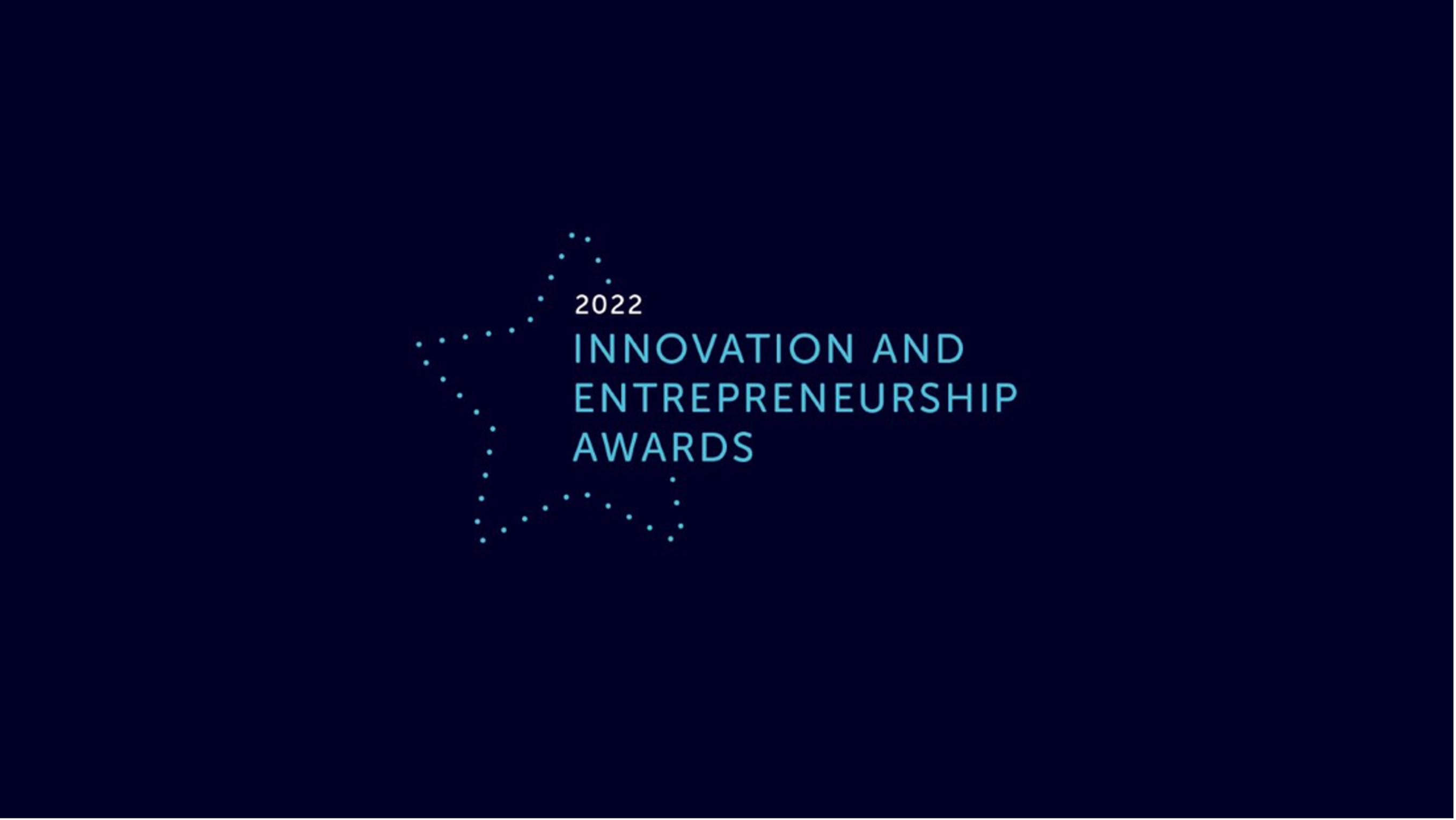
Susanti Susanti (left) and Anjui Wu (right)
Early-career Entrepreneur of the Year
This award celebrates early-career cancer researchers who have shown entrepreneurial initiative and attitude through participation in bespoke training. Susanti Susanti founded PathGen Diagnostik Teknologi to provide affordable molecular diagnostic tools for detecting cancer in developing countries.
Anjui Wu founded Cansor after developing a procedure to identify the ctDNA methylation signature for solid tumours.
Winners: Susanti Susanti, PathGen Diagnostik Teknologi, and Anjui Wu, Cansor Ltd.
Claire Lewis
Woman Entrepreneur of the Year
This award celebrates the outstanding achievements of women entrepreneurs, at any stage of their career, by establishing businesses or setting up transformative partnerships to benefit cancer patients. Claire Lewis, Professor of Molecular and Cellular Pathology at the University of Sheffield, won for her long-standing commitment to cancer research innovation and entrepreneurship, including running a spin-out company, out-licensing multiple novel cancer therapeutics, and successfully collaborating with numerous commercial partners to develop new cancer drug candidates.
Winner: Claire Lewis, University of Sheffield.
Raj Mehta, Adendra Therapeutics
New Startup of the Year
This award celebrates new UK-based companies who have laid the foundations for their new business and raised their first funding round in the last two years. The judges looked for evidence demonstrating a company’s potential, including its ground-breaking technology and the possibility to deliver growth and impact in the cancer sector. Adendra is using new insights into dendritic cell biology to create next-generation immunotherapies for cancer patients.
Winner: Adendra Therapeutics Ltd.
Karl Peggs (left) and Sergio Quezada (right), Achilles Therapeutics
Startup Achievement of the Year
This award celebrates startup companies that have achieved substantial milestones during the previous two years, such as pipeline developments, closure of financing rounds, and entering strategic partnerships or a significant exit. Achilles is a clinical-stage immuno-oncology biopharmaceutical company developing precision T-cell therapies to treat multiple types of solid tumours. It closed an initial public offering on NASDAQ to raise $175.5m.
Winner: Achilles Therapeutics UK.
Further, Faster, Together (Industry–Academia Collaboration)
Claire Eckert (left) and Victoria Goss (right), iDx Lung Collaboration
This award celebrates innovation in oncology achieved through industry–academia collaborations, including partnerships, licenses, and knowledge exchange. The iDx Lung Collaboration works alongside the University of Leeds, the NHS Lung Health Checks, and several commercial partners to trial innovative diagnostic tests for the early detection of lung cancer.
Winner: iDx Lung Collaboration.

Two special categories
In addition to the above categories, which undergo the nomination, shortlisting and judging panel processes, we have two special categories to recognise outstanding contributions to the academic cancer entrepreneurial field with the support of Cancer Research Horizons.
Steve Jackson
Cancer Research Horizons Entrepreneurship Medal
This award recognises an established academic entrepreneur who has created a viable business, demonstrating entrepreneurship and innovation; a person that has made significant, innovative and cumulatively outstanding contributions to enhancing the oncology field. Sir Steve Jackson’s research into DNA damage response is crucial to our understanding of cancer and has already led to the development of the drug olaparib, which is used worldwide to treat certain ovarian cancers.
Winner: Sir Steve Jackson.
Rebecca Fitzgerald
Cancer Research Horizons IMPACT Medal
This award recognises individuals or teams who have made impactful contributions in the field of oncology by progressing the application of their discoveries. The prize celebrates an inspiring team or an individual whose determination has driven forward the translation and commercialisation of their discovery to achieve patient benefit. Rebecca Fitzgerald and her team developed the Cytosponge, which allows non-invasive sampling of oesophageal cells to test for Barrett’s oesophagus, a known risk factor for oesophageal cancer.
Winner: Rebecca Fitzgerald.

The winners at the Innovation & Entrepreneurship awards ceremony.
Case studies
Case study: OncoStars
Case study: Cancer Tech Accelerator
Case study: Venture Builder Incubator
Tiffany Ma
Founder of GambitBio
Awards: Translational grants and awards progressing novel ideas
“The Venture Builder Incubator gave us the technical knowledge we needed to run a company. I feel more confident and my mindset has shifted thanks to the coaching, mentoring and support from the university and our cohort of like-minded entrepreneurs.”
Can you tell us a bit about your background and how you came to set up GambitBio?
I did my undergrad (molecular cell biology) and master’s (Translational Medicine) at UC Berkeley in California and then I came to the UK to do my PhD in oncology at University of Oxford. I started my postdoc in 2023 and I created GambitBio as part of my entry for University of Oxford’s All-Innovate business idea competition.
What real-world challenge do you want to address?
We want to empower everyday people to take control of their health, because depending on which healthcare system you're in, whichever country you're in, there are varying degrees of access to healthcare and not everyone is able to conveniently undertake routine or preventive exams.
GambitBio exists to push for early detection and reduce the number of cancer-related deaths. We want people to be able to detect what is wrong earlier so clinicians can intervene and treat the problem sooner. Early detection can give people up to 95% survival rate over a 10-year period for certain cancer types.
What motivates you as an entrepreneur?
I want to use what I've learned from academic research and my scientific career so far to improve people's lives by creating a novel product. This means combining scientific thinking with a commercial mindset, which I enjoy a lot. As a scientific entrepreneur, I’m motivated by the excitement of combining what I know in novel science and putting it into the commercial setting where I can create a novel product that addresses an unmet need in real life. It’s also the opportunity to work with really smart and passionate people from different parts of the innovation ecosystem including investors, scientists, clinicians, lawyers, academics, founders, manufacturers and more.
“I hadn’t found a programme like the Venture Builder Incubator anywhere else, which is why I applied to join. I have found the Venture Builder Incubator to be very special – the programme is a unique mesh of community building activities as well as technical workshops.”
What success have you seen so far?
During the incubator programme, I was able to gather initial investment from angel investors. This was largely because of the help I got from the Venture Builder Incubator team, who taught me how to pitch effectively by telling a captivating story. They advised me to tone down the technical language when speaking to investors because most of them don’t come from a scientific background. This audience needs to understand the product, market and our business model more than anything else.
How did your partnership with Cancer Research Horizons enhance your experience with the Venture Builder Incubator?
It’s a privilege to be sponsored by Cancer Research Horizons. The financial support we received as part of the programme was very helpful because without that, we couldn't have travelled to Edinburgh this frequently to meet other people in the innovation ecosystem, including entrepreneurs, investors and stakeholders from across the UK. It can’t be overstated how important it is to meet people in person rather than on Zoom. Many amazing entrepreneurs from the University of Edinburgh and the wider Scottish ecosystem have opened doors for us with angel investors, and fellow founders.
What role have the University of Edinburgh, Cancer Research Horizons and Venture Builder Incubator played in your entrepreneurial journey?
It demystified entrepreneurship for our team, as we met like-minded entrepreneurs who are also just getting started. It made the entire process less scary, and it felt good to have a friendly community filled with people who want to help each other.
What is next for GambitBio?
We will finish working on a second prototype in the next three to four months, and will start our next round of seed funding by the end of 2023. We're passionate about GambitBio and are motivated by our core mission to empower the everyday person to take control of their health!
